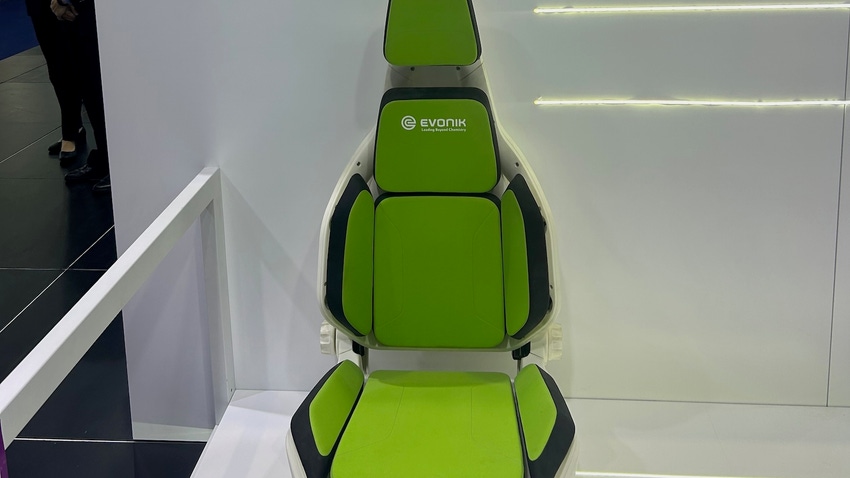Evonik Debuts Single-material PA-12 Car Seat Concept at Chinaplas
PA 12 is used for the seat’s flexible foam, structural components, textiles, and 3D-printed parts.
April 24, 2024

Germany’s Evonik is promoting the monomaterial approach to accelerating material recycling in the auto sector. At this year’s Chinaplas in Shanghai (Hall 7.2 C31), the engineering materials supplier unveiled a concept car seat made solely of Vestamid polyamide (PA) 12. Made entirely of the same material, the seat not only contributes to less material consumption during production, but also is in line with design for circularity. Vestamid PA 12 is employed in the seat’s flexible foam realized via a supercritical foaming process, structural parts, and textiles, while Infinam PA 12 is used for 3D-printed parts.
Multiple applications in new energy vehicles.
Evonik's PA 12 has been widely applied in the manufacture of automotive fuel lines, and now also of cooling lines, hydrogen fuel lines and tanks, and high-voltage electrical busbars for new energy vehicles, meeting the thermal and power management needs of new energy vehicles. In combination with Vestape carbon-fiber PA 12 tape, Vestamid PA 12 exhibits excellent resistance to hydrogen penetration coupled with low-temp resistance and high impact resistance.
Evonik is also doubling capacity for Vestamid E and L PEBA grades to meet demand from the global footwear sector through an expansion in China. The grades are used in midsoles and outsoles. Construction of the new PEBA plant started in December 2023 and the new capacity is due to come on stream in 2025. This followed a 50% increase in global Vestamid PA 12 capacity at Marl, Germany.
Half of product portfolio sustainable by 2030.
By 2030, Evonik aims to have 50% of its product portfolio in the sustainable category, and this encompasses renewable, recycled, and bio-based raw materials for PA. One recent example of this drive is Infinam eCO PA12, which debuted in December 2023 as the world’s first PA 12 powder material for industrial 3D printing that substitutes 100% of fossil feedstock with bio-circular raw material from waste cooking oil in a mass balance process.
Evonik is also using renewable resources in the production of PEBA. Outsole-grade Vestamid LX9012, for example, is produced using green electricity and bio-methane. Vestamid eCo E40, meanwhile, is made using end-of-life tires as a feedstock and renewable energy.
Additives improve processing and quality of recyclate.
To promote the recycling of plastics, Evonik has introduced a diverse range of additives under the brand name Tego Cycle to help its customers improve processing and increase the final quality of recycled plastics. During the wet stage, Evonik's antifoams and wetting agents can be used to make washing, separation, de-inking, and drying processes more efficient and help to significantly reduce energy.
Additionally, during compounding — the dry stage — Evonik's odor absorbers, compatibilizers, and dispersants help to improve processing and enhance polymer properties, leading to more competitive costs and a much higher quality of recycled plastic content. In addition to the Tego Cycle products, Evonik has also introduced organo-modified siloxane-based Tegomer polymer processing aids (PPA) for converters looking to replace standard PPAs made from fluoroelastomers in polyethylene and polypropylene processing.
About the Author(s)
You May Also Like




